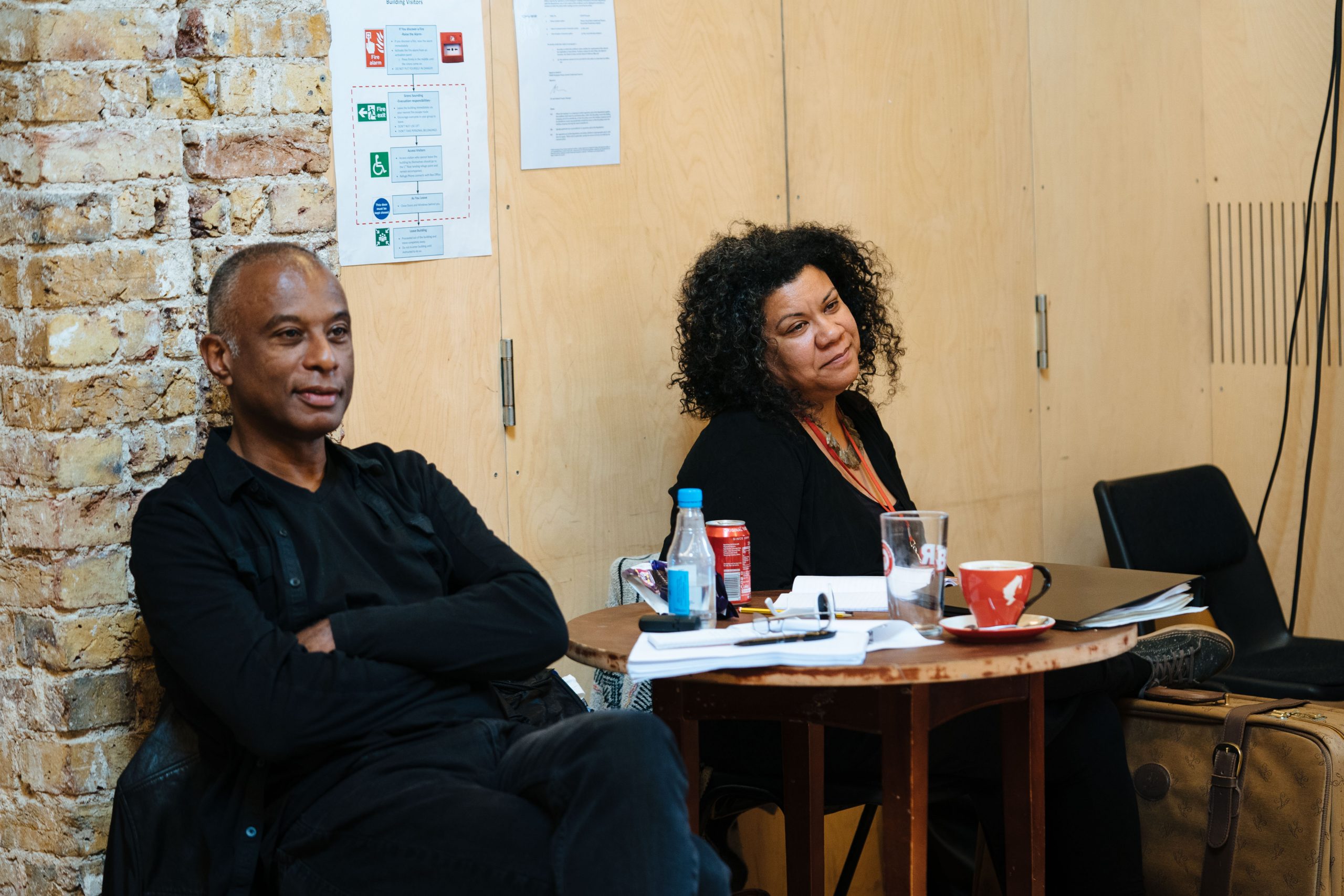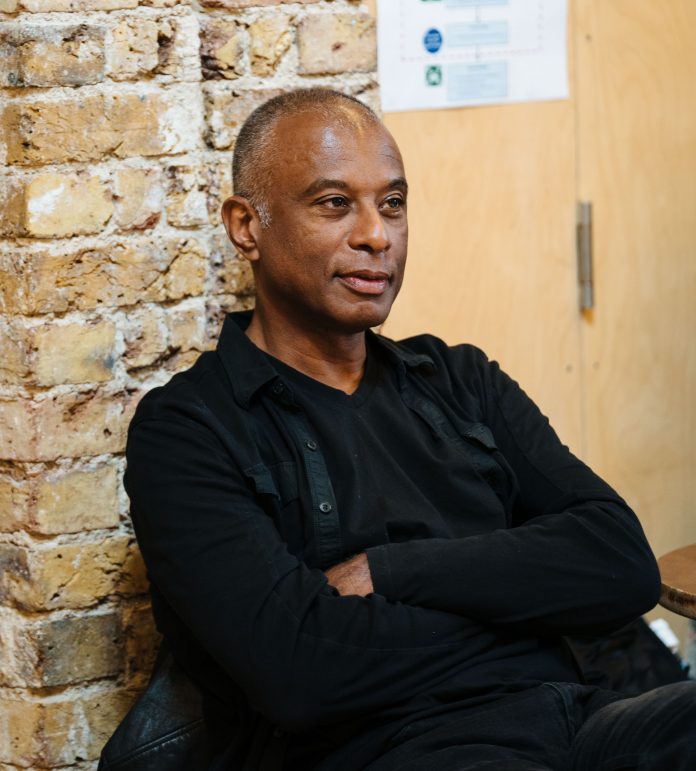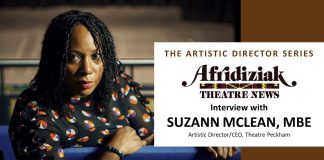Caryl Phillips is one of the UK’s foremost authors. Born in St Kitts, he was just four months old when he left for the UK where his family settled in Leeds. After reading English at Oxford, he immersed himself in the theatre world in numerous jobs before publishing his first play, Strange Fruit in 1981. A dozen awards later, he is best known for his exploration of black people’s experiences moving across the Atlantic in novels and on the stage. His meditations on what it means to belong have influenced a generation; I include myself in that having identified strongly with his work at university. I tried not to fangirl when I met with him to discuss his writing and specifically the revival of Strange Fruit at the Bush Theatre. It is playing until July 27.
It’s great to have you back in the UK, welcome home.
I’m usually back here every four to six weeks anyway. It’s familiar, but it’s obviously particularly chaotic political time to be back here so from that point of view it’s interesting.
Books by people like James Baldwin, Richard Wright were important because it made it possible for me to think that I might be a writer one day because they’d done it and they kind of looked like me.
Much of your work is concerned with the idea of belonging, specifically as it relates to black people in new spaces. How was your thinking evolved during this time where belonging and identity are so central to our politics here in the UK and abroad?
That’s a good question I’m not sure my thinking has evolved much, my feelings have evolved that it’s become a crisis increasingly, you know, it’s an increasingly urgent topic that needs to be addressed. I always felt that it was an urgent and simple topic but I feel that more so than ever because we have the evidence around and now migrants and refugees and asylum seekers who look like traditional immigrants and by traditional, in a British context I’m talking about people from Asia and Africa and the Caribbean. We have immigrants now and people seeking to belong who don’t look like traditional outsiders and that’s why I say it’s become even more urgent now it’s gone beyond a rather easy racial categorisation to something that is far more deeply toxic in society.
What does that say to you about how white British people are constructing ‘their’ national identity?
It’s not good. It doesn’t bode well, does it? The whole debate around who belongs and who doesn’t, feels like we’re going back in time rather than moving forward, so it’s depressing. It sounds somewhat obvious to say it, but it feels rather depressing because we all like to think we learn from history and we learn from our mistakes and we correct them, and we move forward. As individuals, we might do that. You put your hand in a flame, and you learn not to do it again because it’s going to hurt and it’s not a good thing to do. But I don’t think countries operate in that way, I think they do stupid things, they get over it, they forget about it, and they do it again. That seems to be a pattern that we’re in right now.
More and more black writers are breaking through, albeit still at a snail’s pace, in both fiction and non-fiction. You’re teaching at Yale, what excites you about new authors and the voices of this generation?
I don’t read much new work, to be honest. I do read new books, but somebody has to recommend a new book for me to read it. What excites me is that there is evidence of more voices. One of the things about reading when you’re younger is that you read everything – partly because you think you’re never going to die, and you’ve got all the time in the world. Which is exactly how it should be; you should be trying to read everything, and as widely as possible. But as you write more and you get older, you realise that certain books were important to you, that you’d like to read again. So, I tend to prioritise that these days, to be honest. The type of books I’ve been returning to have been books I never thought I would read again. Some books I read as a teenager like Anna Karenina, some books that I read when I was starting out as a writer that were important to me.
Books by people like James Baldwin, Richard Wright were important because it made it possible for me to think that I might be a writer one day because they’d done it and they kind of looked like me. So, I’ve been rereading their work. Like you were mentioning studying books at university, there are a couple of authors who I read at university who I really liked and have never really gone back and reread. I went back, and I started to reread what I guess you would call classic authors like Conrad and Faulkner, who I did like at university, but I wondered if didn’t have to do an exam on them if they weren’t on the syllabus, would I still like to read them? So that’s kind of what I’ve been doing.
Living as you do between the UK and the US at this turbulent political time, where many of issues around ‘belonging’ and race feel similar, what do you think are the discursive differences between the two countries?
Well, I think there’s much more openness about these issues and in America because it’s a migrant society. It has been built on the idea of people coming from the outside, making a contribution and having to fit in and assimilate. The borders of belonging in America, the boundaries of belonging in America, are pretty low. The only two communities for whom the boundaries for belonging are set high are Native Americans and African-Americans because it’ s a national embarrassment that there was slavery and it’s a national embarrassment that there was a genocide of the Native Americans.
That’s a lot of what the play is about; people, particularly West Indian immigrants, feeling that they are of Britain but strangely are not fully accepted.

So, there is a problem with both of those communities fully participating in American life. But for most other people you basically show up at Ellis Island and seconds later you’re in, you belong. You can belong with your Irish heritage or your Swedish heritage, Jewish heritage and it doesn’t take that long. So, there’s lots of fiction, lots of art about belonging to America and being part of a national narrative because it’s how the country developed. It’s not the case in this country.
To belong to Britain is difficult. You don’t just show up and put down your suitcase and say here I am, I want to be a part of the gang. It doesn’t work like that in this country. There are lots of obstacles and hoops to jump through. You can be Christian and white, and you can look like you have all the credentials and you still don’t belong, for reasons you might not fully understand. So, I don’t think the debate is as sophisticated in this country; I think it’s stuck around questions of guilt and discomfort with Britain’s island, fortress heritage. I just don’t think it’s as open here.
That brings us to the new production of your play Strange Fruit, what about this particular moment we’ve been discussing, made you want to revisit Strange Fruit now?
Well, to be honest, it’s the theatre that wanted to revisit the play. I am happy that they did, but it wasn’t me who contacted them and said I would love to have the play put on, it was them who got in touch with me. I think once we started to talk however it became pretty reasonably clear that there were lots about the present moment that was still relevant – particularly the sense of people feeling that they both belong to Britain and they don’t belong to Britain. That’s a lot of what the play is about; people, particularly West Indian immigrants, feeling that they are of Britain but strangely are not fully accepted. I think in today’s Britain it’s not just West Indian immigrants or Asian; it’s not just black or brown immigrants that feel that sense of being of and not of Britain. The whole Brexit issue involves people from countries like Italy, Bulgaria and France all sorts of white European migrants who feel this as well; thinking that they may have to leave after Brexit. So, I think it’s a very topical time to examine what it feels to belong and yet not of Britain.
Strange fruit evolved from a poem from the Billie Holliday song we are so familiar with, which has been referenced, sampled and paid homage to by black artists across a range of mediums. From where do you think this iterative power comes?
I think because it’s such a startling and disturbing image. It’s an image that is both at once poetic and historical. It has a tremendous amount of weight because if you just imagine the image, it’s disturbing but then it’s rooted in history so it speaks a particular historical point and there’s nothing innocent about the phrase, and there’s nothing innocent about image and there’s certainly nothing innocent about the historical period it evokes. So, for all those reasons, I can see why people like Kanye West would want to sample it, I can see why it recurs time and time again book titles, song titles, it has that unique comprehension and history.
Finally, I read in an article you wrote that when it was first produced no journalist asked you about the relevance of this play’s title. So, I have to ask you now, what does Strange Fruit mean to you in this work?
I like to think of that title, not just in terms of the Billie Holliday song, which obviously has racial overtones but, I also think of kids as fruit in a sense from a tree. If you can imagine a tree as the parent and you bear fruit that’s how you regenerate, so it sort of works both ways; it works in terms of thinking about the song and the racialised content of the song but it also in terms of thinking about generations.


























